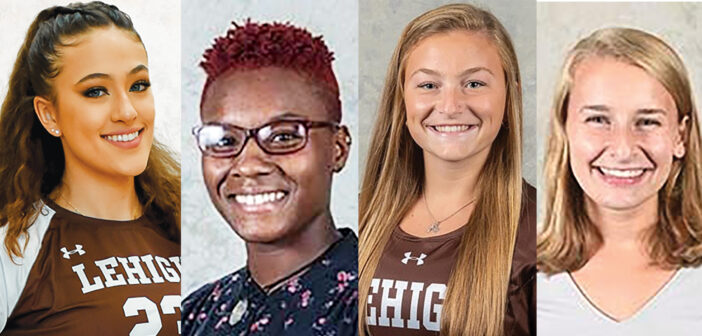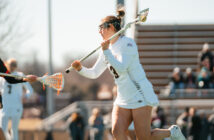The Brown and White spoke with four student-athletes — Sabrina Lancaster, ‘21, Jamie Zamrin, ‘22, Katia Carnevale, ‘23, and Teasha McKoy, ‘22, — to discuss what it means to them to be a woman in sports.
Q: Growing up, what women in sports did you look up to?
Sabrina Lancaster, outside hitter on volleyball: Growing up, I looked up to Destinee Hooker who was a phenomenal right-side hitter for the University of Texas and the U.S. team. She has always been relentless and determined in her performance and didn’t care what anyone else thought and persevered.
Jamie Zamrin, women’s cross country and track and field: When I started getting into sports I played tennis so I was really into Serena Williams; she was a big icon for me. As I got older, I got into the pro runner scene, specifically Emma Coburn. Her coach in high school was a coach at a camp that I went to, and ever since I went to that camp I’ve been obsessed with her.
Katia Carnevale, attacker on women’s lacrosse: I was a big soccer player and one of the number one players at the time, and still is, was Alex Morgan. The feminim aspect that she always wore with her pink pre wrap made me feel so proud, and I wanted to be exactly like her growing up.
Teasha McKoy, thrower on women’s track and field: I have a twin sister, so a lot of the time people would compare us to Serena and Venus. Particularly in track and field, I was a sprinter at the time so I loved Carmelita Jeter, an amazing Olympian, because she was so muscular, strong, fast and could pull it off.
Q: What is your favorite memory associated with sports?
SL: I can’t really pinpoint it to one exact instance, [except for]forming a comradery throughout my highschool and especially collegiate careers. We found greatness in the struggle and discipline, and being a part of a team is the greatest thing I could ever ask for.
JZ: My dad knew that I was going to be a runner. When I was 6 years old, my dad and brother were playing tennis next to the track at the highschool and I got bored of playing with them so I went to run on the track. He watched me run one lap, then another, and I kept going and I ran a full mile. No one in my family runs and it was completely random; I almost passed out because it was so hot in the summer. My dad always looks back on it and says ‘you were a natural born runner.’
KC: One of my favorite memories growing up was having my dad coach me in soccer. My dad is my favorite person on the planet and for him to be able to teach me something we both shared a love for was super special to me.
TM: When I played soccer in high school, we won our league championship for the first time in history during my freshman year.
Q: What do you think is the biggest barrier in driving the visibility of women’s sports?
SL: Putting in an effort to watch women’s sports because we don’t get as much spectatorship as our male counterparts. We can do that by going to our fellow women’s teams games and making sure we are tuning in. The more support and visibility we can give as fans and spectators, [the more]people will realize how great it is to watch women’s sports.
JZ: A lot of it is the imagery. Girls are taught to be small and pretty, and then you look at these professional athletes who are super built and girls don’t want to be taken as manly when they’re younger. It’s really hard to convince girls who have been taught all their lives to be successful by looking pretty, that they can [also]be muscular and that’s still beautiful and a sign of femininity and strength as a woman.
KC: There has always been the stereotype that men are better athletes all around. So it has always drawn more attention because they are ‘more entertaining’ or are ‘more physical’. We struggle to get past those stereotypes. We are built differently than them, but it doesn’t change the power and value of our sports.
TM: People think that men are more athletic, and superior, in general. The first thing that comes to mind with this is the WNBA vs. NBA. I think the WNBA is catching some steam right now because people are realizing that women’s basketball players are dope and can play.
Q: How do you think male athletes can help to drive more visibility towards women’s sports?
SL: Show support. If you have a sister team, show [them]support and [give]them visibility by promoting the role models we do have and the people we look up to.
JZ: Making the playing field equitable: you don’t necessarily throw a girl into an all guys practice, but you do encourage girls to be able to do the same things as guys to the best of their abilities. A lot of women are convinced that they will never reach the same heights as guys, so when [they]are willing to build them up, it can be more powerful than even a coach saying it.
KC: Anything media [where they]show their support and say out loud to people expressing their actual genuine enjoyment of female sports could help people change their minds about them. To hear coming from a man to go watch a women’s team play means a lot, coming from a gender that doesn’t experience the inequality that we do.
TM: I think showing support in general and highlighting female success in sports for other people to see that not only women are fighting for visibility; everyone is fighting [with them].
Q: What does it mean to you to be a woman in sports?
SL: It’s powerful. It means dominance; it means assertiveness. It means you’re putting in the same determination and hard work that men are expected to do in sports and you’re breaking barriers and showing women how truly strong it is to be a woman.
JZ: You start to break down barriers you never thought were possible before. Sports is a big performance, and you’re showing off to everyone around you what you can do. It’s a symbol of strength and power to be able to get out there every single day and do something that can get pretty grueling. Running is not always pretty, you’re covered in sweat, you have spit all over your face at the end of a race. Being able to handle and push through all the incredibly difficult moments while still trying to show poise and grace doing something [shows me that]I can do anything that I want to do because I’m able to run.
KC: My whole entire life, I’ve identified as a female athlete and it is something that has made me so proud and comfortable in my own skin. Sports are my life, and being an athlete means the world to me. It’s given me my friends, the best coaches, and some of the best life lessons so I couldn’t even imagine not being a female athlete. Even though it’s not everything, it’s helped me figure out the other things that I am.
TM: Women who are muscular in athletics have always provided a safe space and paved a way for me. I had trouble with my body image in feeling not feminine enough or being too masculine as a woman. For me, it’s been trying to move away from seeing myself that way and accepting and embracing my physical appearance [because]a woman shouldn’t look one certain kind of way.
Q: What advice would you give to a young girl who is just starting off in sports?
SL: Don’t let anyone discourage you from following your dreams no matter how unrealistic they may seem to everyone else. If you truly love your sport, then pursue it and then if you don’t like the path you are going on, or the current sport you are pushing to, don’t be afraid to stand up and be strong and don’t give up because a bunch of girls everywhere are looking up to you.
JZ: Be confident in your authentic abilities no matter what anybody tells you. As long as you are confident in [yourself], it will take you farther than anything else.
KC: I would say to always compete, no matter the gender or the level. Never let who you are going against hold you back from doing what you can do and have fun while you’re doing it.
TM: Don’t care about what other people say about you because it’s not about other people’s opinions, it’s about making sure you’re doing something that you love. If I was talking to myself, I would say that “you are beautiful the way you are and there is nothing more beautiful than strength.”
Q: Where do you see women in sports 10 years from now?
SL: I see them transcending more boundaries than ever thought before. I see stronger, faster, more determined, more headstrong women [who aren’t]afraid of what others think of them, playing the sports to the [best]of their abilities and breaking the gender norms.
JZ: Women are constantly improving, especially in my sport where we see records are being shattered every year in every single event. Women are getting closer and closer to things that never seemed possible and outperforming in ways they never thought a woman could, and hopefully sports are going to continue getting more inclusive for women.
KC: We have made monumental strides in the past 10 years. The difference between now and 1999 alone is monumental. I only see growth from here. I don’t see us going backwards in any way, shape, or form, I only see people having the realization that women’s sports is just as awesome as men’s.
TM: I’m hoping that equal pay will be a thing and women’s visibility will be more prevalent in athletics [and]that there will be more equality and more representation.






Comment policy
Comments posted to The Brown and White website are reviewed by a moderator before being approved. Incendiary speech or harassing language, including comments targeted at individuals, may be deemed unacceptable and not published. Spam and other soliciting will also be declined.
The Brown and White also reserves the right to not publish entirely anonymous comments.
2 Comments
Enjoy the teamwork, enjoy the competition, enjoy the game. I applaud your efforts and appreciate your successes as Lehigh athletes.
Powerful interview. I agree with Teesha Mckoy. We need equal pay for women in sports. I hope we can get there sooner. https://urbanwomanmag.com/equal-pay-for-women-in-sports/